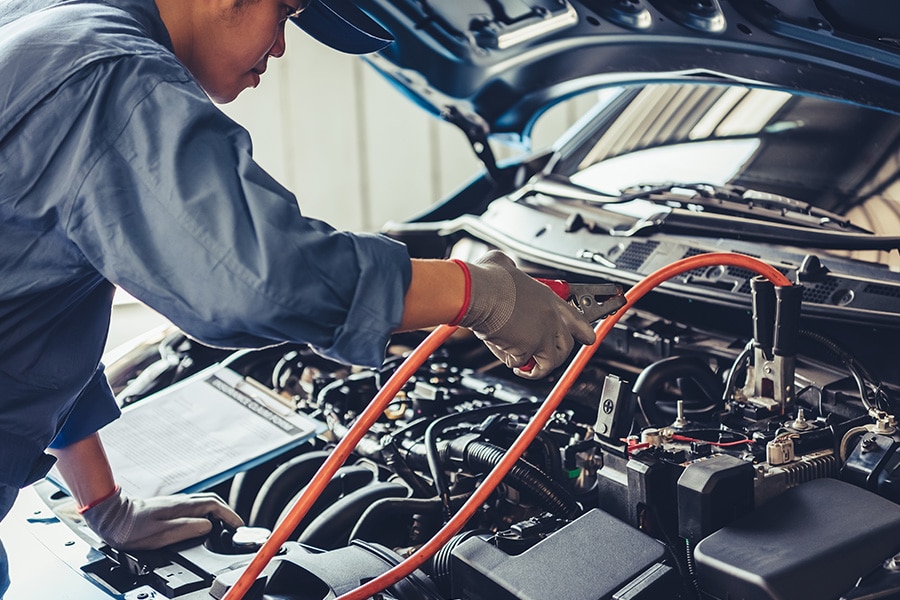Experts are divided on the issue of electric mobility. Are electric cars really the only alternative to become carbon-neutral? When considering overall environmental performance, i.e. including battery manufacture, some doubt is at least in order here. Nevertheless, the registration figures for electric cars and hybrid vehicles have been rising sharply for several years.
With 63,281 fully electric vehicles and 239,250 hybrids in 2019, Germany has never seen so many registrations of electric cars. Last year, electric cars accounted for 1.8 percent of all new registrations, and hybrids for 6.6 percent. At the same time, companies such as Volkswagen, Daimler or Fiat want to discontinue the development of combustion engines, or have already done so. One more reason for garages to have the issue of electric mobility on their agenda.
Electric mobility is the way forwards
Even if it’s gambling on the future: Independent garages should be dealing with this. Whether to generate extra turnover, make up for possible falling sales or to simply raise their profile as highly efficient companies. Independent garages must take action here, particularly in ensuring their employees are qualified to work on high-voltage systems.
After all, without a special qualification, a standard car mechatronics engineer is not allowed to change a wheel on electric and hybrid vehicles or even drive the car into the workshop.
Further training for the Workshop Advisory Board
Garage employees can obtain qualifications by attending special courses to ensure safe, professional working on vehicles with high-voltage systems and their components. For example, in January we got together with Trainingszentrum Saar to organise a high-voltage training course for our Workshop Advisory Board. Have you not heard of our Workshop Advisory Board? Then take a look at this blog post: We want to be closer to workshops! – Our Workshop Advisory Board. Thanks to this additional qualification, the members of the board can now carry out general work on hybrids and other vehicles with high-voltage (HV) systems.
Participants are also allowed to pass on this knowledge to their colleagues at the garages and body shops. As a result, they are also entitled to offer support with work on HV systems, provided this takes place under supervision. So a high-voltage training course is always worth doing!
"The high-voltage course was very good. Thanks to the knowledge we've acquired we can now approach such tasks calmly. We've already had the first vehicles in for converting/retrofitting electrical systems on the HV vehicle. And there's no let-up here, as we're already receiving enquiries about bodywork on hybrid trucks. I wouldn't have thought we'd be confronted with this so soon in vehicle construction. Let's see when the first commercial vehicles turn up here for repair. That’s no longer a problem now you've organised a training course with Trainingszentrum Saar."
You can find more information about this course on the website of Trainingszentrum Saar.
High-volt careers ladder
Info sheet 200-005 "Training for work on vehicles with high-voltage systems" issued by DGUV, the German association of accident insurance institutions, states that all employees working on high-voltage vehicles must hold an additional qualification.
A distinction is made here between three levels. Only after the first stage are garage employees permitted to perform work on motor vehicles equipped with a high-voltage system – provided that they are isolated.
Completion of Stage Two then allows them to carry out more extensive tasks on vehicles with a high-voltage system. This involves de-energising electric cars, commissioning such vehicles and also carrying out diagnostic work.
Vehicle specialists with Stage Three are also permitted to work on/near exposed live parts in HV systems.
Stage 1
Non-electronic work
- Test drives
- Bodywork
- Change wheels/oil
Stage 2
Disconnection, electronic work in the non-live state
- Isolation
- Safeguarding against reconnection
- Verification of the non-live state
- Replacement of high-voltage components
- Removal of plugs + replacement of components (e.g. DC/DC converters, electric air conditioning systems)
Stage 3
Live work on the HV system and work in the proximity of exposed live parts
- Troubleshooting
- Replacing parts live
Stage Three of the training pyramid is above all aimed at garage employees already with a professional HV qualification for whom the investment required here is substantial. In such cases, this easily exceeds several tens of thousands of euros. According to "Schaufenster Elektromobilität", an initiative of the German government, one-off investment costs of some 10,000 euros should be expected for the basic level if an employee is to service and repair electric vehicles.

